The Queen’s Gambit, but for Children’s Board Games
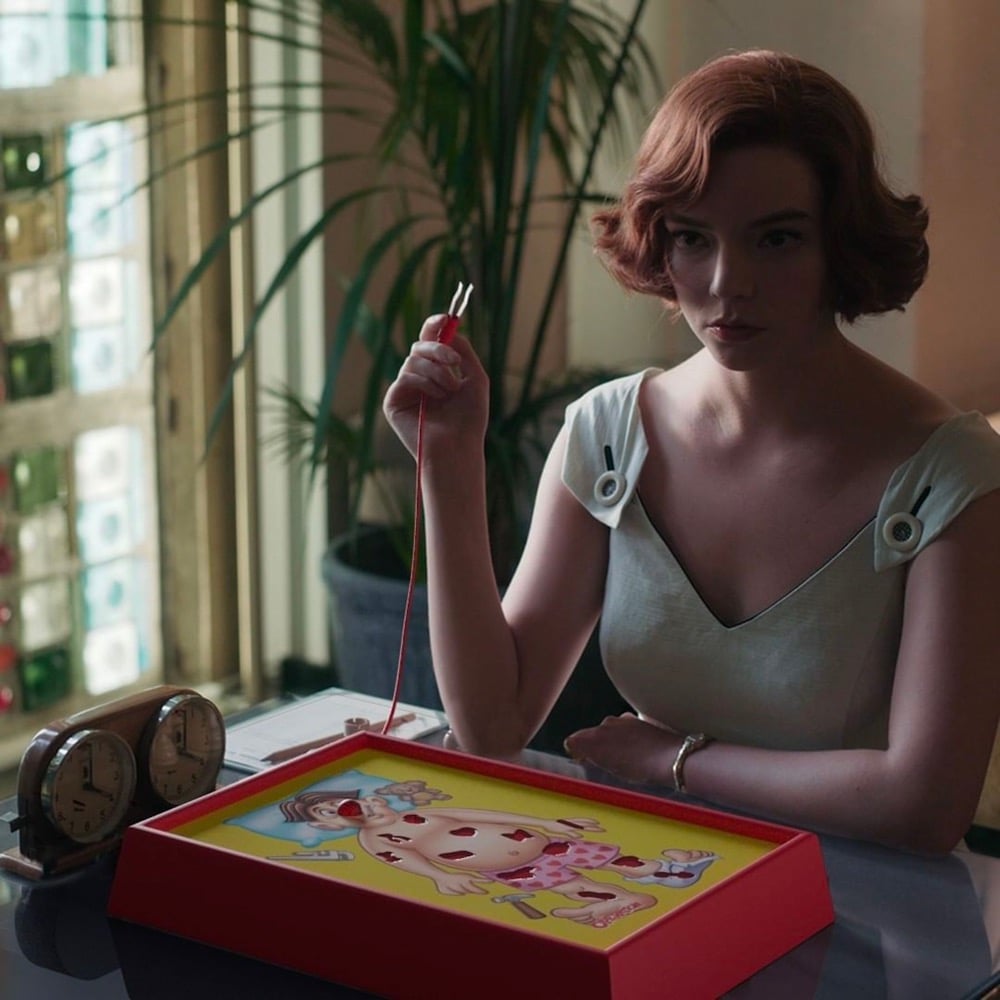
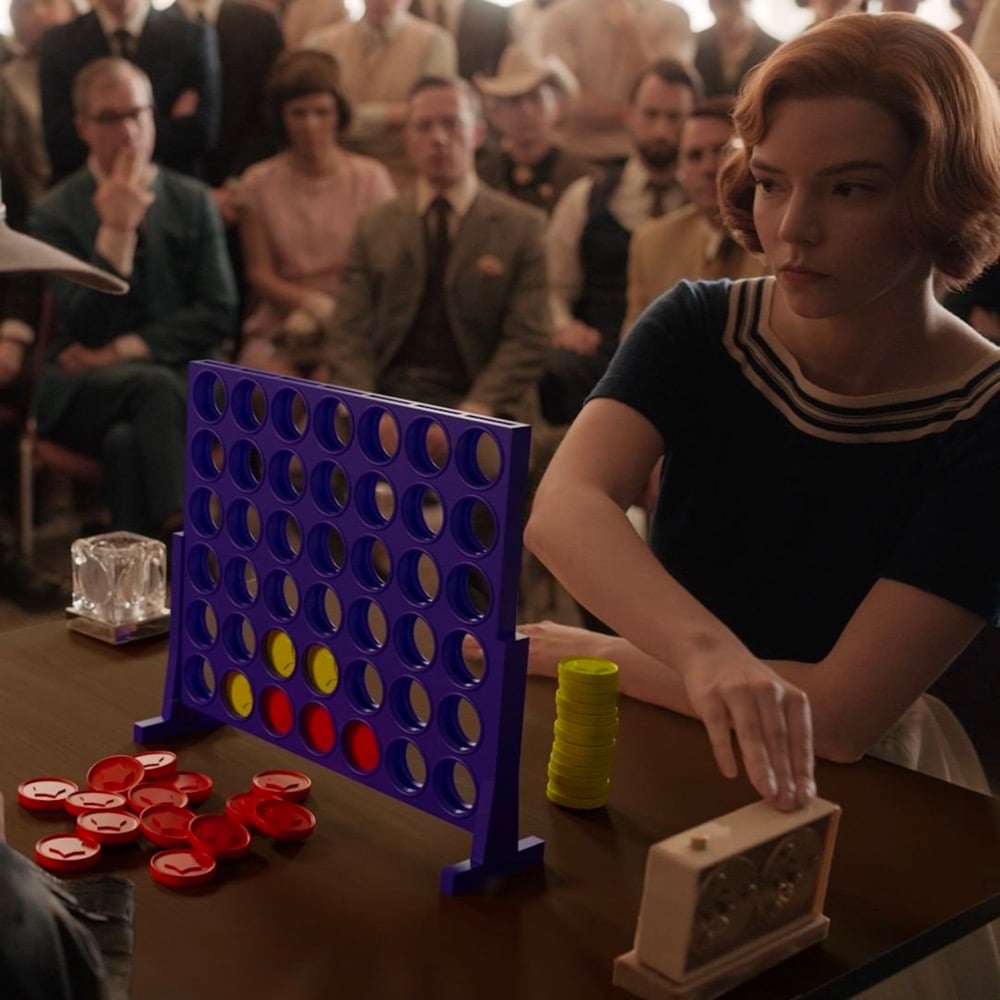
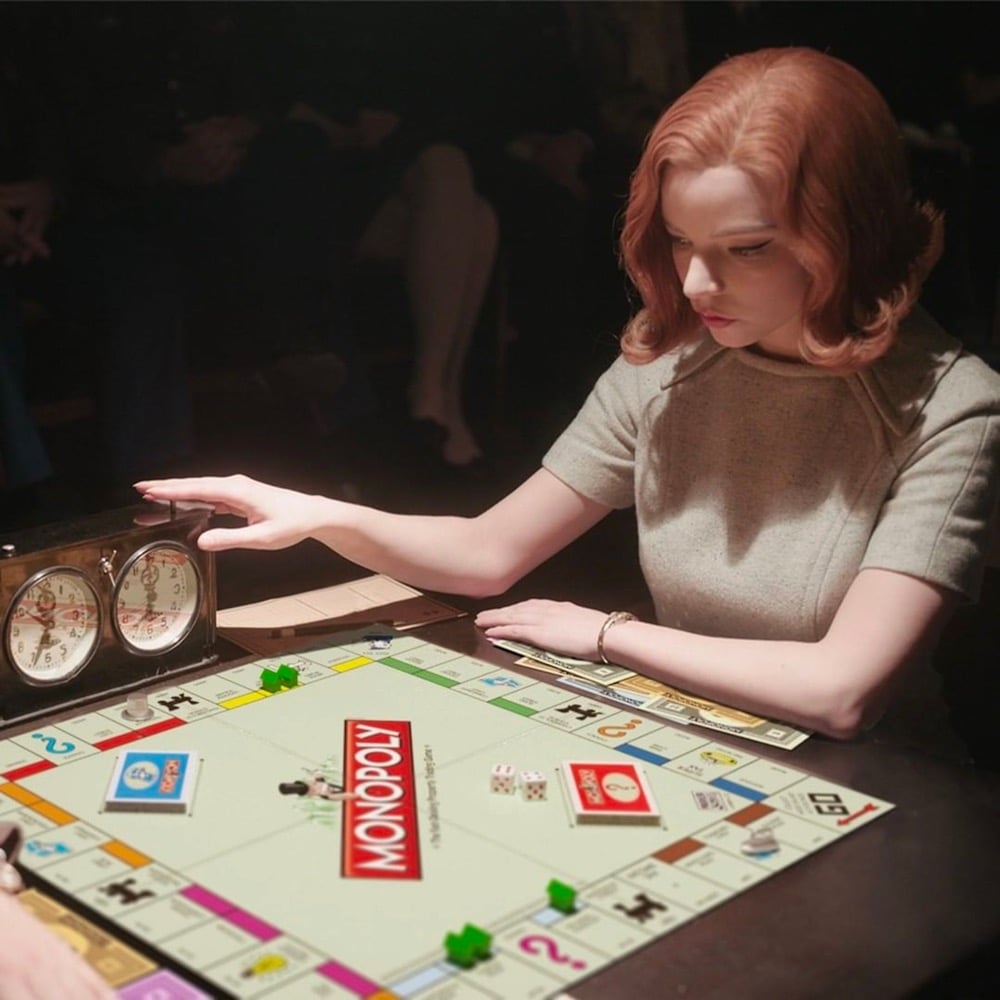
Netflix spoofed their own hit show by photoshopping Beth Harmon from The Queen’s Gambit intensely playing children’s board games like Operation, Monopoly, Connect Four, and Jenga.



This site is made possible by member support. 💞
Big thanks to Arcustech for hosting the site and offering amazing tech support.
When you buy through links on kottke.org, I may earn an affiliate commission. Thanks for supporting the site!
kottke.org. home of fine hypertext products since 1998.



Netflix spoofed their own hit show by photoshopping Beth Harmon from The Queen’s Gambit intensely playing children’s board games like Operation, Monopoly, Connect Four, and Jenga.
This is one of those posts that’s really easy to understand — it’s the famous intro to The Simpsons recreated using stock footage, just like the title says right up there — but I’ve gotta write something here to take up a little space and time, so I end up just saying the same thing using the same words (intro, Simpsons, recreated, stock, footage) like you’re all 3 years old or something. (Why do we need more than six words to describe this?) Anyway, this video is the introduction to the American television show The Simpsons recreated using only stock video footage. Enjoy.
See also: stock footage intros to Duck Tales and Friends and the stock footage trailer for Koyaanisqatsi. (via the morning news)
Holy shit, do I miss going to the movies. Oh, and going everywhere else. Anyway, every few months for the past couple of years, I’ve shared the movies, books, music, TV, and podcasts I’ve enjoyed (or not) recently. Here’s everything I’ve “consumed” since the beginning of the year. (Don’t sweat the letter grades — they’re so subjective that I don’t even agree with them sometimes.)
Mank. Wanted to hate this, for secret reasons. Didn’t. (B+)
The Royal Tenenbaums. I have seen this movie a half dozen times and it’s still so fresh every time. (A+)
The Painter and the Thief. Best movie I’ve seen in months. (A+)
In & Of Itself. Everyone was raving about this and so I watched it and…I don’t know. It’s a magic show. I can see why people find it interesting, but watching it the night after The Painter and the Thief, it paled in comparison. (B+)
Ava. Jessica Chastain is good in this movie that is otherwise pretty bleh. (C+)
I’m Your Woman. Loved the 70s vibe of this one — not only the in-film setting but it had the feel of a movie made in the 70s as well. (B+)
Idiocracy. Fascinating documentary of the Trump presidency. (A-)
Star Wars: The Empire Strikes Back. Sure, Star Wars was the biggest movie in the world but without such a strong sequel, maybe we’re not still talking about these movies more than 40 years later. (A)
Blood Simple. First Coen brothers movie and Frances McDormand’s debut. (A-)
L.L. Bean fleece-lined hoodie. The most comfortable piece of clothing I’ve ever owned. (A+)
Wonder Woman 1984. This wasn’t nearly as bad as everyone said it was, but they should have worked a little harder on making an entertaining movie and less on hitting the audience over the head with a moral lesson. (B+)
Song Exploder (season two). The Dua Lipa and Trent Reznor episodes were the standouts here. (B+)
Ammonite. Great individual performances by Ronan and Winslet. (B+)
The Mandalorian (season two). Enjoyed this way more than season one. The final scene in the last episode… (A-)
MacBook Air M1. A couple of years ago, I bought an iPad Pro intending to use it for work on the go. For folks whose work is mostly email and web browsing, the device seems to work fine but after a solid year of trying to make it work for me, I gave up. Last month, I bought a MacBook Air M1 to replace my 6-year-old iMac, my 9-year-old Air, and the iPad. It’s a remarkable machine — lightning fast with a long-lasting battery. I’ll be much happier traveling with this, whenever it is that we get to travel again. (A)
The Crown (season four). The show has never reached the giddy heights of the first two seasons, but Gillian Anderson’s Margaret Thatcher was a fantastic addition to the show. As someone on Twitter said, Anderson played Thatcher perfectly: as a sociopath. (A-)
Sunshine. Rewatch. Afterwards, as one does, I looked the film up on Wikipedia and of course Alex Garland (Ex Machina, Devs) had written it. (A-)
Florida by Lauren Groff. Excellent and eclectic collection of short stories. (B+)
Phantom Thread. Undoubtably a masterpiece but also something that I personally find it hard to get fully into. (B+)
Emma.. Super-fun period piece starring Anya Taylor-Joy. (A-)
In Our Time, Eclipses. I love any opportunity to hear about eclipses. (A)
Hang Up and Listen: The Last Last Dance. This picks up where The Last Dance left off with the story of Michael Jordan’s second (and much less successful) comeback with the Washington Wizards. (B+)
Soul. A sequel of sorts to Inside Out. The underworld score by Trent Reznor & Atticus Ross is fantastic. (A)
Ready Player One. Almost in spite of myself, I like this movie. (B+)
The Hobbit film series. Not as good as the Lord of the Rings movies, but not as bad as commonly thought. (B)
Locked Down. This took a while to get going, but Hathaway and Ejiofor are both really good in this. I’ll tell you though, I really had to be in a certain mood to watch a movie about the first weeks of pandemic lockdown. It will be really interesting to see how much appetite people will have for pandemic-themed movies, TV, books, art, etc. (B+)
Young Frankenstein. Madeline Kahn is only in this movie for like 5 minutes but she so dominates the screen that it feels like much longer. (A-)
Batman Begins. I don’t know why Christopher Nolan wanted to direct a series of superhero movies, but I’m glad he did. (A-)
This American Life, The Empty Chair. There are so many more podcasts now than there were 10 years ago, but This American Life is still consistently among the best and they don’t get enough credit for that. (A-)
Criminal, The Editor. I will listen to anything about people who love encyclopedias. (B+)
The Midnight Sky. I feel like I’ve seen this movie — or a movie very much like it — several times before. (B)
Ocean’s 8. Good fun. And Awkwafina! (B+)
Past installments of my media diet are available here.
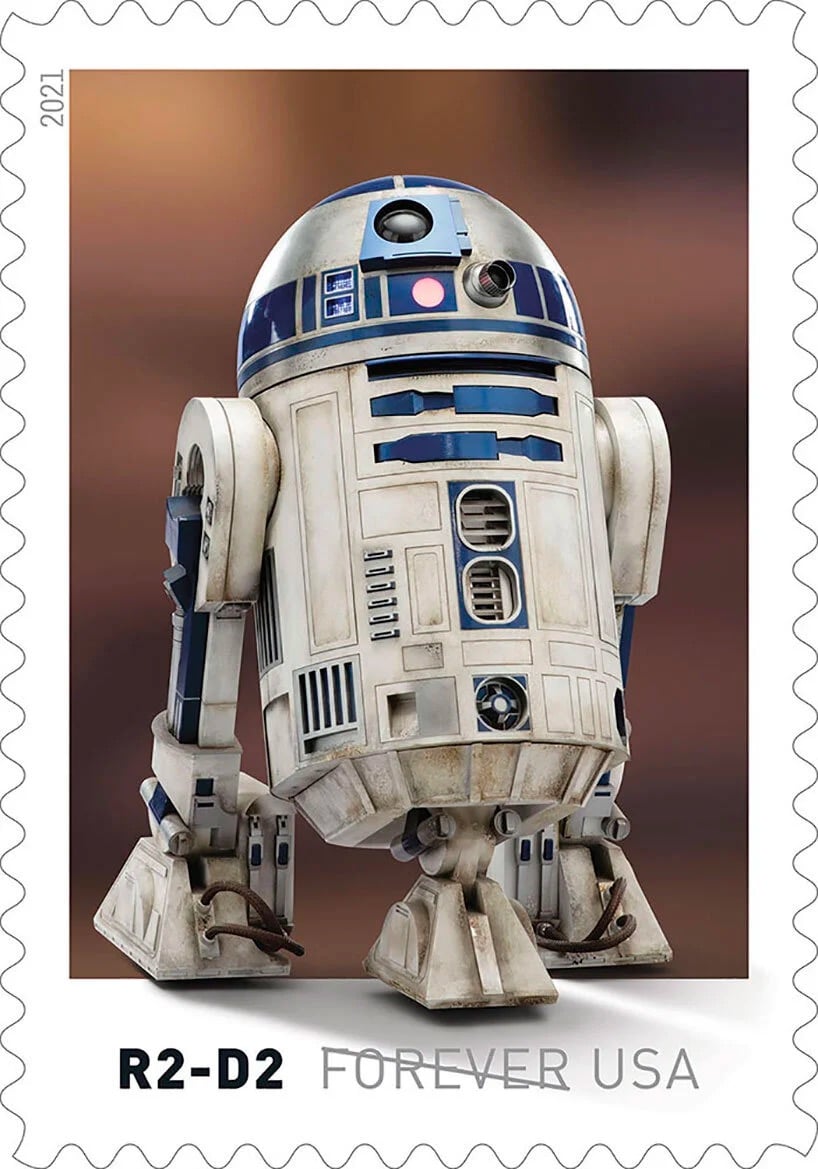
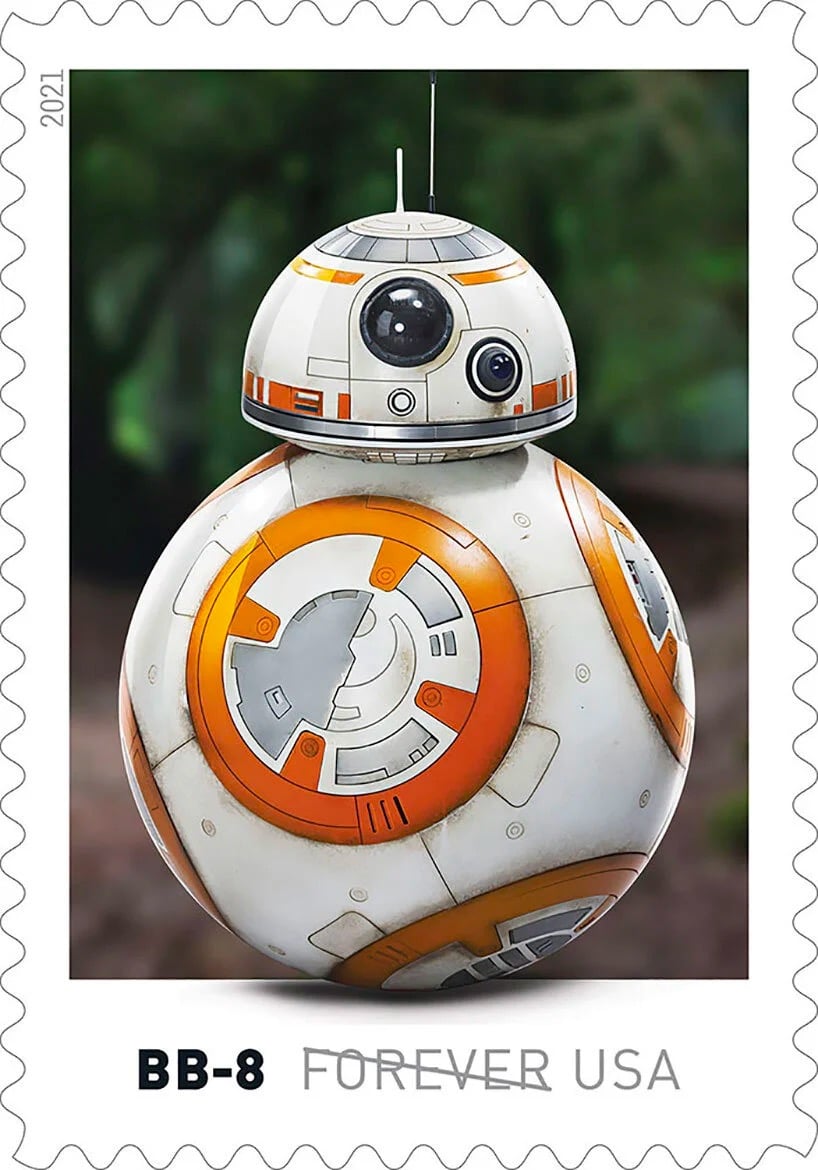
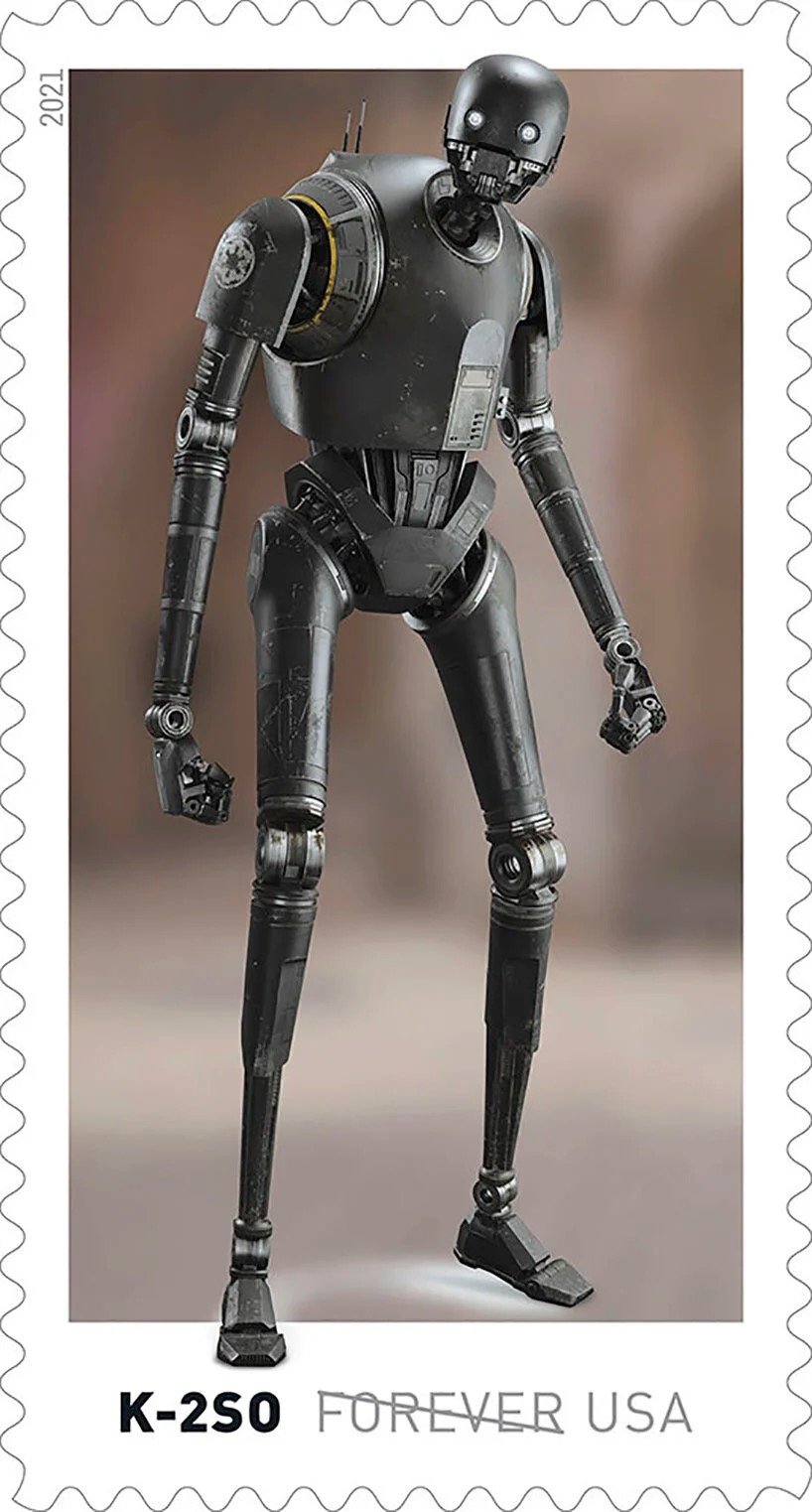
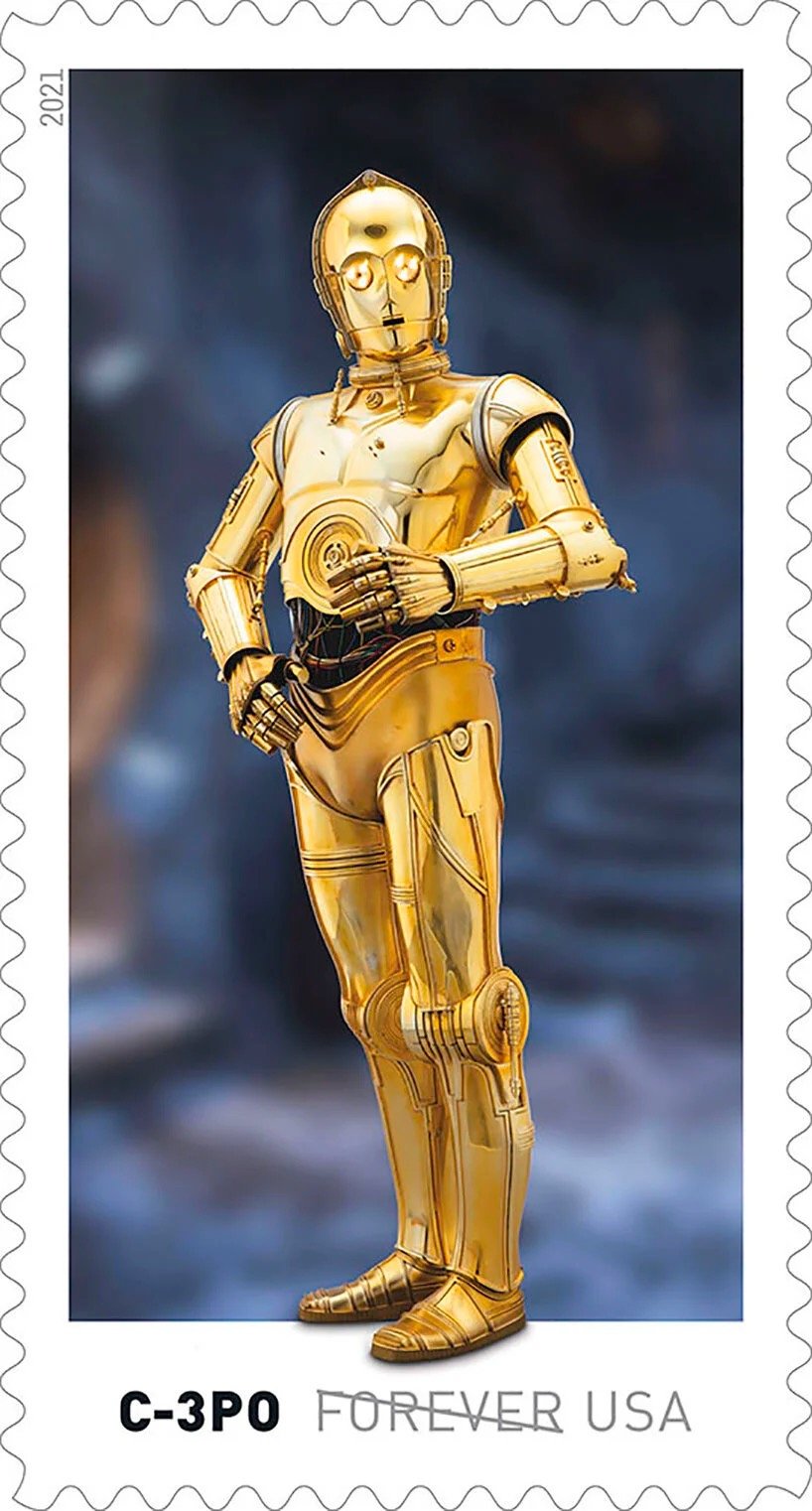
The spring, the USPS will be releasing a set of 10 stamps featuring droids from Star Wars movies and series. (These are the droids you’re looking for lolololol.)
Representing more than four decades of innovation and storytelling, the droids featured in this pane of 20 stamps are IG-11, R2-D2, K-2SO, D-O, L3-37, BB-8, C-3PO, a GNK (or Gonk) power droid, 2-1B surgical droid and C1-10P, commonly known as “Chopper.”
The characters are shown against backgrounds representing settings of memorable adventures. The selvage features a passageway from the floating Cloud City above the planet Bespin, introduced in “Star Wars: The Empire Strikes Back.”
(thx, caroline)

For the past few years, I’ve been keeping track of everything I read, watch, listen to, and experience in my media diet posts. As a media diet wrap-up, here’s the most compelling content & experiences from 2020, stuff that helped stimulate and sustain me in a year of isolation and pandemic.
Portrait of a Lady on Fire. This was the final movie I saw in a theater before the pandemic hit; I chose well. Not a week has gone by this year that I didn’t think about some aspect or another of this film.
You’re Wrong About. By far my favorite episodic podcast. The joy with which the hosts delight each other with insights and humorous asides is the engine that drives the show. Literally my only complaint: I wish they hadn’t changed the theme music.
The Queen’s Gambit. Seems like everyone watched this miniseries this fall and I loved it just as much as anyone.
The Rain Vortex at Singapore’s Changi Airport. An enchanting oasis in the middle of an airport indicative of Singapore’s incorporation of natural elements into urban spaces.
MASS MoCA. For my birthday, I treated myself with a road trip to this superb museum. The Sol LeWitt, James Turrell, and Jenny Holzer exhibitions alone were worth the trip. I sorely miss museums.
Ted Lasso. Mister Rogers’ Neighborhood + Major League. Who knew you could make radical empathy funny? Everyone I’ve recommended this show to has loved it.
The Land That Never Has Been Yet from Scene on Radio. An essential series on American democracy. Like, do we even have one? It’s hard to choose, but the episode on how the libertarianism of the contemporary Republican Party was the result of a deliberate campaign by just a few people that increasingly came to dominate American politics is my favorite.
Carol. I remember liking this back when it came out, but my rewatch a couple of months ago was a revelation. A remarkable, sparkling film.
Caste by Isabel Wilkerson. Wilkerson has a gift for finding new ways for her readers to think about entrenched systems and behaviors.
Devs. This show got neglected a little in the end-of-year lists because of an early-in-the-pandemic release, but it was one of my top 2-3 shows this year.
The Great. I really enjoyed this Hulu show as I watched it and it’s grown in my esteem in the months since. It’s one of the first shows I recommend when friends ask what I’ve been watching lately. Huzzah!
Nintendo Switch. To distract themselves from the pandemic, did America spend more hours playing video games or watching TV? I did both. Mario Kart 8, Super Mario 35, Rocket League, Fortnite, Minecraft, Among Us, and all the old NES games were popular in our household this year.
Conversations with Friends by Sally Rooney. I found reading difficult for most of the year — I only finished three books in the past 10 months. But this one I couldn’t put down; finished it in two days.
Exhalation by Ted Chiang. Perfect little stories expertly told. Don’t miss the endnotes, where Chiang reveals where the ideas for each of his stories came from.
AirPods Pro. The best augmented reality device yet devised — the music feels like it’s actually in your head more seamlessly than ever before.
Little Women. Fantastic casting, performances, and direction. Waiting patiently for whatever Gerwig does next.
My Brilliant Friend (season 2) & Normal People. I didn’t think anyone could effectively adapt either of these authors, but somehow the shows nearly equalled the books.
The Splendid and the Vile by Erik Larson. Everything from Larson is great and this book about the Battle of Britain and the triumph of leadership resonated throughout this pandemic year.
Future Nostalgia. I listened to this more than anything else in 2020. Also notable because IMO there are no skippable songs on this album.
Tomidaya shoyu ramen. This tiny ramen shop in the Little Tokyo section of Saigon is supposed to closely resemble Japan shops. One of the best bowls I’ve ever had.
The Mandalorian. I was lukewarm on season one but loved season two. Of all the recent Star Wars things, this show best channels the sometimes goofy/campy magic that made the original movie so compelling.
The image above is an overhead view of my home office, where all the kottke.org magic happens.
That someone was able to turn Elena Ferrante’s Neapolitan novels into a compelling TV series is nothing short of miraculous. It could have gone so wrong.1 A key aspect of that success has to be Max Richter’s score for the show. I’ve been listening to the season one soundtrack for awhile now, but just stumbled across the season two soundtrack.
That’s today work music sorted, then.
P.S. For the first couple of months of the pandemic, I shared what I was listening to during my workday in this thread (continued here). Check it out if you need some wordless music to beaver away to.
Same with Sally Rooney’s Normal People. The TV series could have been terrible but it very much was not.↩
Have you watched Ted Lasso? If not, you should — it’s probably my favorite TV thing of 2020. (It’s ok if you don’t care for sports. It’s not about sports.) Maureen Ryan’s excellent review of the series gets at why people are finding it so compelling.
A few weeks ago, I stumbled across this 2016 essay by Nora Samaran, who later expanded it into a slim but transfixing book called Turn This World Inside Out. It addresses a number of persistent questions I’ve had with lucid, thoughtful prose.
As Samaran puts it, “the men I know who are exceptionally nurturing lovers, fathers, coworkers, close friends to their friends, who know how to make people feel safe, have almost no outlets through which to learn or share this hardwon skill with other men…. Meanwhile, the men I know who are kind, goodhearted people, but who are earlier on in growing into their own models for self-love and learning how to comfort and nurture others, have no men to ask. … The answer to all of these difficulties is to openly discuss nurturance: how it looks, how it feels, how men can learn to practice it from the men who already know how.”
Ryan argues that Ted Lasso is an outlet that models the type of nurturing that Samaran is talking about.
Ted Lasso does a lot of things well — I adore the budding friendship between Rebecca and marketing whiz Keeley (Juno Temple) — but one of the things it explores wisely and well is what it looks like when men engage in (sorry for using these dreadful words) nurturing behaviors.
It’s a sprightly, well-constructed, enjoyable comedy about sports, sure, but it’s also about men who — like the many good men I have known (even in Hollywood!) — take responsibility for the example they set, for their emotions and for the actions they take. Ted Lasso will remain deeply valuable into next year and beyond, because it is also about a bunch of very different people who display fulfilling, conscientious confidence and leadership — not the bullying, toxic, arrogant, violent, condescending domination that has, in this country, has too often masqueraded as “leadership” and “confidence.” In evolving and supporting each other through those changes, these characters form friendships and communities that are truly meaningful.
Watching the show and reading this, I can’t help but think of another person who modeled kindness, goodheartedness, and nurturing male behaviors on TV for decades: Fred Rogers. (See, for instance, soaking in a kiddie pool with François Clemmons.) Ted Lasso co-creators & co-stars Jason Sudeikis and Brendan Hunt are right around my age; I’d be shocked if one or both of them didn’t watch a bunch of Mister Rogers’ Neighborhood growing up like I did. The two shows are obviously very different but Rogers’ brand of radical empathy is all over Ted Lasso. As I’ve grown more conscious over the past decade about the type of person I want to be in the world and the type of example I want to set for my kids, Rogers has been a guiding light and I’m happy to add Ted Lasso to the list as well.
Update: I forgot to add: another aspect I appreciate about the show is it demonstrates how you can be competitive without being toxic. Lasso is a very competitive guy who cares about winning, but he goes about it in a constructive way, not a destructive way. It’s the kind of energy their mom and I are always trying to impart to our kids, who are both competitive (albeit in pretty different ways).
See also Building Belonging at Summer Camp.
Forgive me reader, for I have been lazy. It’s been 7 months since I’ve shared a list of the movies, books, music, TV, and podcasts that I’ve been watching/reading/listening to, uh, recently. But I’ve been diligently keeping track1 and so here’s everything I’ve consumed since early May. Warning: soooo much TV and soooo many movies (and bad ones at that) and very few books. At the end of most days — after work, parenting, cooking yet another meal I’m not actually in the mood for, and constantly refreshing Instagram — I just don’t have enough left in the tank for books. (Oh, and as usual, don’t pay too much attention to the letter grades!)
Winds of Change. A fun ride but ultimately kind of empty? (B)
How to Be an Antiracist by Ibram X. Kendi. Perhaps not what you’d expect going in — thought-provoking on almost every page. (A)
The Ezra Klein Show — Madeline Miller. Super interesting, especially if you’ve read Song of Achilles or Circe. (A-)
Godzilla. This was sort of the tail end of my pandemic disaster movie film fest. (C+)
Fetch the Bolt Cutters. I love that this exists but it is not for me. (B-)
The Mirror & the Light by Hilary Mantel. I knew it was coming, Thomas Cromwell’s downfall; it’s historical fact after all. But somehow the actual moment shocked me, despite Mantel’s careful foreshadowing over hundreds of pages. (A)
Normal People. No way in hell was this going to be as good as the book, but they somehow did it. Stellar casting. (A-)
Fleabag Live. I wanted to love this like I loved the TV show but could not get into it. (C+)
Star Wars: The Rise of Skywalker. Whatever else you might think about the third SW trilogy, the casting was fantastic. (B+)
Partysaurus Rex. One of my favorite Pixar shorts. (A-)
Iron Man 3. The only MCU movie I hadn’t seen. It was…fine? (B)
Dunkirk. A masterpiece. (A)
Arrival. Another masterpiece. (A)
Kursk. This should have been better. (B)
Harry Potter at Home. My kids and I listened to this in the car and loved it. (A-)
Watchmen. After admitting I’d stopped watching after a few episodes, several of you urged me to keep going. I finished it but still was not as dazzled as everyone else seemed to be. Maybe if I’d read the graphic novel? (B+)
Against the Rules with Michael Lewis (season two). This season was all about coaching and may have been even better than the first season. (A-)
The General. A silent film masterpiece from Buster Keaton. The kids were a little bored at first but ultimately loved it. (A-)
The Endless. Solid sci-fi horror. (B)
13th. A powerful argument that slavery is still constitutionally legal and alive & well in the United States. (A)
Ida. Beautiful film. (B+)
The Last Dance. I grew up watching and rooting for Jordan and the Bulls, so this was the perfect nostalgic entertainment. Jordan comes off as both more and less of a dick than I remember. (A-)
Da 5 Bloods. This was a mess. (C+)
Undone. Inventive animated sci-fi with plenty of plot left for season two. (B+)
Celebrate Your Body (and Its Changes, Too!): The Ultimate Puberty Book for Girls by Sonya Renee Taylor. Borrowed this from my daughter to brush up on how to help her approach some changes coming down the pike. (A-)
Beyond Meat. I snuck some of their ground “beef” into a casserole to try it out and see if the kids would notice. They didn’t at first, but once I told them, the three of us agreed that it was not that tasty — and definitely didn’t taste like beef. Plus I had an upset stomach until noon the next day. (C-)
Knives Out. I enjoyed this much more the second time. (A-)
Honeyland. A maddening microcosm of modernity. (A)
The Conversation. Maybe this hit me on an off-night? (B+)
The Great. Super fun show from the screenwriter of The Favourite. (A-)
Hamilton. Obviously better in person (and 4 years ago), but the performances and music are so great it doesn’t matter. (A)
Slate Money — Modern Monetary Theory. Really interesting alternate way of thinking about the economy, federal debt, inflation, and taxes. They kinda jumped right into the middle of it though, leaving this interested MMT beginner a little baffled. (B)
12 Monkeys. So very 90s. Brad Pitt is great in this though. (B+)
Cloud Atlas. An underrated gem. (A)
The Old Guard. Engaging and built for a sequel. But what isn’t these days? (B+)
Cars 2. I’d only ever seen the first 2/3s of this because my then-4-year-old son was so upset that the onscreen baddies were going to kill Lightning McQueen that we had to leave the theater. (B-)
Nintendo Switch. Such a fun little console that doesn’t take itself too seriously. (A-)
Greyhound. Not Hanks’ best effort. (B)
Radioactive. An overly complicated movie about a complex woman. (B+)
Ratatouille. The scene where Ego takes his first bite of ratatouille still gives me goosebumps. (A)
The Speed Cubers. Heartwarming story. (B+)
Project Power. Incredible that they were able to turn the story of Henrietta Lacks into a superhero movie. (B+)
Pluto TV. Am I the last person on Earth to find out about this app? Dozens of channels of reruns that you can’t pause and are interrupted by ads, just like old school TV. I’ve been watching far too much old Doctor Who on here. (B+)
Folklore. I don’t really get Taylor Swift and that’s ok. (C)
This Land. Excellent and infuriating — this had me yelling at my car radio. (A)
13 Minutes to the Moon — Apollo 13. Not as good as season one about Apollo 11 or Saving Apollo 13, but still compelling. (B+)
Black Panther. Had to rewatch. Rest in peace, Chadwick Boseman. What a loss. (A-)
Conversations with Friends by Sally Rooney. Anything she writes, I will read. (A)
Master and Commander: The Far Side of the World. I had forgotten how slow this starts, but once it gets going it’s completely gripping, even the quiet parts. (A-)
Contact by Carl Sagan. First time I’d read this in many years. Did not resonate as much as it had in the past. (B+)
Contact. They should have sent a poet. (A-)
True Grit. Hailee Steinfeld is fantastic in this. (A)
Being John Malkovich. Terrific performance by Malkovich. This was a favorite movie of mine for years but its impact on me has lessened. (B+)
Reply All, Country of Liars. The origin story of QAnon. But let’s just say there are some unreliable narrators in this story. (B+)
Jurassic Park. A blockbuster masterpiece. (A)
50 First Dates. One of the very few Sandler comedies I really like. (B+)
I’m Thinking of Ending Things. Really did not vibe with this one. (C+)
Pride & Prejudice. I am a huge sucker for this film. (A)
MASS MoCA. Took a day trip down here back in October. My first museum since Feb. Sol LeWitt, James Turrell, Jenny Holzer, great building, virtually no one here on a weekday — very much worth the 6-hour RT car ride. (A+)
Palm Springs. Groundhog Day + 50 First Dates. (A-)
Kona Honzo. After getting a taste of mountain biking on a borrowed bike, I upgraded to this hardtail. Had some really great rides on it but also stupidly crashed, landed on my face, had to go to the ER, and got 9 stitches on my chin. Would not recommend crashing (stupidly or otherwise, but especially stupidly), but I liked mountain biking enough to get back on the bike a couple of weeks later. (A-)
My Octopus Teacher. As I said previously: “It’s such a simple movie but it packs a surprising emotional wallop and is philosophically rich. Even (or perhaps especially) the bits that seem problematic are thought-provoking.” (A)
His Dark Materials. I like the show but the main character is so irritating that I don’t know if I can keep watching… (B+)
You’re Wrong About — Princess Diana. I never fully understood the appeal of Princess Diana but now I do. Excellent 5-part series. (A)
Human Nature. Documentary on Netflix about the discovery and potential of Crispr. (B+)
The Booksellers. Was ultimately not that interested in this. (B)
Ted Lasso. Mister Rogers’ Neighborhood + Major League. Who knew you could make radical empathy funny? (A+)
The Queen’s Gambit. So well done in almost every way. (A)
Haywire. Solid Soderbergh thriller. (B+)
Enola Holmes. I will watch almost any Sherlock Holmes adaptation, riff, or spin-off. (B+)
The Trial of the Chicago 7. I loved this. Classic Sorkin and great ensemble cast performance. (A)
Zama. Maybe surrealist film is not my cup of tea. (B)
AlphaGo. I’d read a lot about the events in this film, but seeing it play out was still gripping and surprising. This and My Octopus Teacher would make a great double feature about the shifting definition of what makes humans human. (A)
The Way I See It. Pete Souza reflects on his proximity to power. (B+)
The Queen. Had to watch this after the Princess Di You’re Wrong About series. (B+)
Lego Star Wars Holiday Special. Is this canon now? If so, I have some questions. (C)
Carol. Holy shit, wonderful! I think I held my breath for the last two minutes of the movie. (A+)
Song Exploder. TV version of the OG podcast. The REM episode was great. (B+)
Rogue One. I wouldn’t call this the best Star Wars movie, but it isn’t not the best Star Wars movie either. (A-)
Little Women. Rewatched. I love this movie. (A)
Tenet. Primer + James Bond. Maybe the pandemic has made me dumber, but this totally confused me. In a bad way — it could/should have been simpler. (B)
Caste by Isabel Wilkerson. A masterful examination of the skin color-based caste system of the United States, compared and contrasted with the caste systems of India and Nazi Germany. (A)
Past installments of my media diet are available here.
People have asked so here’s the extensive system I use to keep track of everything: the Notes app on my phone.↩
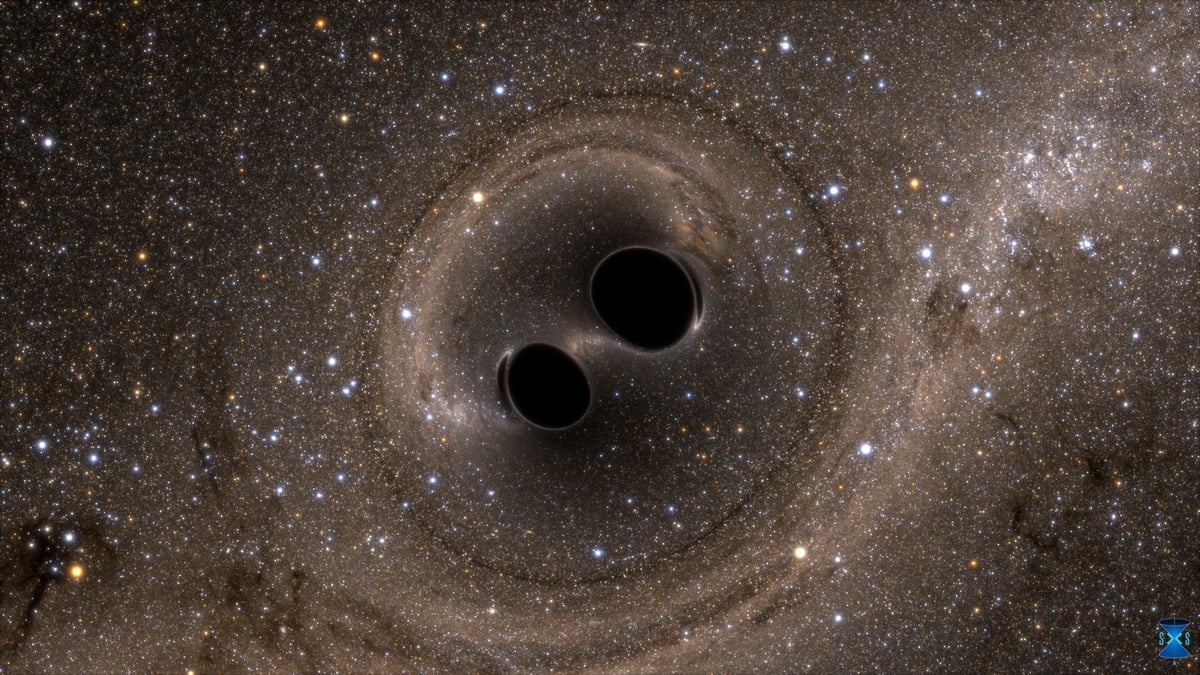
COVID-19 has required all of us to scrutinize our actions and sacrifice our desires and even our obligations in order to keep ourselves and those around us safe. I want to examine two cases where reasonable, well-informed, and influential people make entirely different choices based on largely similar evidence.
You may have heard that MSNBC host Rachel Maddow has been quarantining at home following close contact with a person who had tested positive for COVID-19. You may have also heard that last night, Maddow returned to her show (still filming from home) to reveal that this person was her partner of 20+ years, artist/photographer Susan Mikula. Mikula is recovering, but at at least one point, the couple genuinely feared for her life. Maddow herself is still testing negative; with Mikula in much less danger and Maddow nearing the end of quarantine, they felt it was time to open the curtain on their experience.
If you haven’t seen it already, I’d like you to watch the video of Maddow describing her experience of living with a loved one who is suffering from COVID-19, whom you have to care for but cannot touch without grave risk to yourself, and then to others. (It is about Mikula’s own experience, but it’s really much more about Maddow’s experience, for good reason.)
Here’s a quick excerpt, if you want a textual preview (via Vulture):
“Just believe me: Whatever you have calculated into your life as acceptable risk, as inevitable risk, something that you’re willing to go through in terms of this virus because statistically, hey probably, it will be fine for you and your loved ones, I’m just here to tell you to recalibrate that,” [Maddow] warned. “Frankly, the country needs you to recalibrate that because broadly speaking, there’s no room for you in the hospital right now.”
She cites hospitals being overwhelmed with a “50 percent” increase in patients “in two weeks.” While it may be easy to risk your own life, the virus doesn’t let you make the choice. “What you need to know is whoever’s the most important person in your life, whoever you most love and most care for and most cherish in the world, that’s the person who you may lose and who you may spend weeks up all night freaking out about and calling doctors all over the place and over and over again all night long, trying to figure out how to keep that person breathing and out of the hospital,” she said. “Whatever you’re doing, however you’ve calibrated risk in your life, don’t get this thing.”
Another moment worth noting in the video is shortly after she begins. Maddow is interrupted by a recurring beeping noise in a room off-camera. She has to attend to it herself, in the middle of a live television show, because there’s no one else at home who can do it. She takes off her microphone and earpiece, then has to put it back on. After already revealing at the beginning of the show that she’s not wearing makeup—she doesn’t know how to apply it herself, and no one can help her—it’s a nice peek behind the scenes.
I don’t know if everyone always understands how much work it takes it is to perform for live television: how many accessories you need, how much support is required. People don’t see what you have to look like, sound like, or act like; they don’t see the almost cyborg contraption you have to become in order to make a successful television appearance. Being good at television is a specific skill. It’s as different from writing, reporting, or public speaking as football, baseball, and basketball are from playing polo. It doesn’t matter if you have your words on a teleprompter (although that does help): you still have to deliver them, in time, no backsies, and look and sound good while you’re doing it.
The disruption of the show also happens in the middle of a charming metaphor Maddow uses to describe her relationship:
The way that I think about it is not that she is the sun and I’m a planet that orbits her—that would give too much credit to the other planets. I think of it more as a pitiful thing: that she is the planet and I am a satellite, and I’m up there sort of beep-beep-beeping at her and blinking my lights and just trying to make her happy.
Compare this to Farhad Manjoo’s essay in The New York Times today, “I Traced My COVID-19 Bubble and It’s Enormous.” Manjoo starts with a classic dilemma: he knows it’s unsafe in general to travel for Thanksgiving, but he wonders if it might be safer for his family, given the size of their social circle and the precautions they’ve taken. He’d like to find out more, to replace his general intuitions, which pull him in both directions, with something more concrete. This is a time-honored journalistic premise (a rhetorical trope, really) for answering a question many people might have.
In researching his close contacts, and their own exposure to other people, Manjoo quickly has cold water thrown on the notion that his bubble is in any way contained to the degree he’d imagined it to be. (This part of the story is well-illustrated: I’ll give you the text excerpts, but it’s worth clicking through and scrolling through yourself.)
I thought my bubble was pretty small, but it turned out to be far larger than I’d guessed.
My only close contacts each week are my wife and kids.
My kids, on the other hand, are in a learning pod with seven other children and my daughter attends a weekly gymnastics class.
I emailed the parents of my kids’ friends and classmates, as well as their teachers, and asked how large each family’s bubble was.
Already, my network was up to almost 40 people.
Turns out a few of the families in our learning pod have children in day care or preschool.
And one’s classmate’s mother is a doctor who comes into contact with about 10 patients each week.
Once I had counted everyone, I realized that visiting my parents for Thanksgiving would be like asking them to sit down to dinner with more than 100 people.
He isn’t actually done counting yet: from himself, he’s only gone to three degrees of separation. But presumably, the point in the headline is made. The author’s bubble is enormous, and presumably the reader’s is, too.
Then a curious thing happens. Manjoo decides that what he’s learned doesn’t matter. He thinks his family and his contacts are special after all. “All of my indirect contacts are taking the virus seriously—none of them spun conspiracy theories about the pandemic, or suggested it was no big deal or told me to bug off and mind my own business.” (This is a very low threshold for “taking the virus seriously.”) And he would really like to take his wife and children to see his parents. An epidemiologist gives him some cover, saying his desire to see their parents is understandable, and it’s all a matter of assessing and evaluating risk.
So, he changes his mind again. He makes a few concessions (drive, not fly; an outdoor meal rather than an indoor one; staying off-site rather than sleeping over). And he’s going to travel five hours each way with his wife and children and their 100+ direct and indirect contacts to celebrate Thanksgiving with his parents.
This is contrarianism on a scale not usually seen in a newspaper article. (They’re usually too short to take this many turns.) It is one thing to counter received wisdom by posing a counterfactual. It is another to spend hours of reporting, gathering facts, calling in experts, putting everything on the record, and then deciding that none of that matters.
On Twitter, I called it “the full Gladwell”; only Malcolm Gladwell at The New Yorker can consistently pull this hairpin twist off and stick the landing, even if he frequently violates good sense and plain facts to do it.
It’s important, though, that this is not just a rhetorical trick. These are the real lives of real people, both in the story itself, and radiating out to its readers and their contacts in a global newspaper, the United States’ paper of record. And the reasoning and evidence that are considered but discarded gives the illusion that this is a choice motivated not by setting reason aside, but considering all options and maximizing one’s expected utility.
Not to “both sides” this, but I’m gonna “both sides” this: in some sense, both Maddow and Manjoo are putting their thumb on the scales, in opposite directions. For Maddow, the experience of almost losing the love of her life makes it so that she would take no willing risk that might endanger her or anyone else. (She acknowledges that a certain amount of unavoidable, unwilling risk remains.)
Manjoo is different. He acknowledges that he has no such experience. He is less concerned with the possible loss of his parents’ lives than the loss of their presence in his life and in their childrens’ lives. He sees the willing assumption of risk as an open moral question, and something that can be calculated and appropriately mitigated.
Maddow has constructed a universe where she is a tiny satellite orbiting a much larger planet, whose continued health and existence is the central focus of her concern. Manjoo has drawn a map with himself at its center, where anyone beyond the reach of his telephone falls off the edges.
Maddow is also explicitly pleading with her viewers to learn what they can from her experience, and adjust their behavior accordingly. Manjoo is performing his calculus only for himself; he implicitly presents himself as a representative example (while also claiming he and his circle are extraordinarily conscientious and effective), but each reader can draw their own conclusions and make their own decision.
At this point the balancing dominoes tip over. Maddow’s position, her argument, and her example are clearly more moral and more persuasive than Manjoo’s. Manjoo’s essay is worth reading, but the conclusion is untenable. It doesn’t do the work needed to arrive there or persuade anyone else to do the same. And at a time when many people are spinning conspiracies about the pandemic, or claiming that it’s no big deal, and in turn influencing others—when we haven’t even yet considered the virus’s impact on the uncounted number of people, from medical staff and many other essential workers to prisoners and the impoverished, who do not simply get to choose how to spend their holiday—it’s irresponsible.
The larger moral tragedy is that because our leaders have failed, and too often actually worked to damage the infrastructure, expertise, and goodwill accumulated over generations, we have no consistent, authoritative guidance on what we should and should not do. We do not know who to trust. We have no money, no help, and no plan but to wait. We have no sense of what rules our friends and neighbors, colleagues and workers, are following when they’re not in our sight; we don’t even know what practices they would even admit to embracing. We have no money; we have no help. We are left on our own, adrift in deep space, scribbling maps and adding sums on the back of a napkin. We are all in this together, yet we are completely alone.
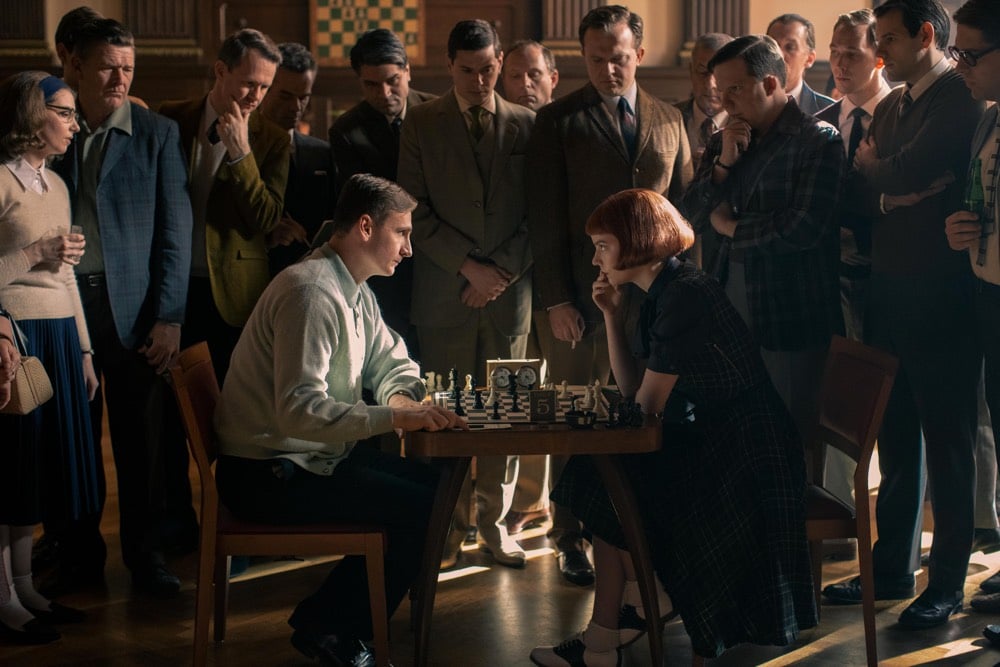
Like many of you, I watched and loved The Queen’s Gambit on Netflix (trailer). Part of the reason it’s so compelling is the care the show’s creators took in accurately portraying the chess players, games, and tournaments. Over the past few weeks, I’ve been reading articles by and interviews with chess experts on what the show got right and wrong. I’ll link to some of them below, but this interview with Garry Kasparov, one of the best chess players ever and an advisor to the show, is particularly worth reading. Here he talks about choosing a real game to be played as the final match in the series (spoilers):
Most of the games, it was not difficult, but the biggest challenge was the last game, because the last game is just, it’s a full game. And the problem is that the last game had to be played by the Queen’s Gambit. Of course I could pick up games from other openings, but it would be very much against the spirit of the book. How did I find a good game that will be played for 40 or so moves adjourned in a complicated situation? And then you have this very important element of Benny and his team calling from New York. It means the position had to be complicated. I found a few games and picked up one: Patrick Wolff against Vassily Ivanchuk, Biel Interzonal, 1993. Wolff sent me a note a couple of days after the show was released: “I recognize the game.” It was quite an obscure game. He said, “Garry, how on earth did you find it?” I said, “I had certain parameters, with the gambit, the number of pieces left, so basically, I ended up with 700 games.” It’s not perfect, because it’s not exactly as complicated as I want it, but it fit the book description: game adjourned, complicated position. And even with all the ruckus, he’s pushing the rook. The rook is trapped in the center. I preserved most of the game description and I think it helped, because that’s a climax, and the climax is something that people always recall.
The interview is interesting throughout. Here are some of the other articles I’ve read: former pro Linda Diaz, former top 10 player Judit Polgar (and others), former NY Times chess columnist Dylan Loeb McClain, chess pros Alexandra and Andrea Boetz, 2-time US champ Jennifer Shahade, and ChessBase editor Albert Silver.
The green screen is a staple of visual effects for movies and TV. You film actors in front of a green or blue screen and then use digital editing technology to replace the solid color with any background you’d like. But as Phil Edwards explains in this video, the effects teams for some movies and shows (like Disney’s The Mandalorian) have swapped green screens for virtual sets. In lieu of block colored backgrounds, the actors are surrounded by massive LED panels that display the background and background action so everything can be filmed in one go.
It’s a pretty cool technique. Among the benefits of such a system: you get the “natural” light from the LEDs falling on the actors and other objects in the scene, so you don’t need to add it in later digitally or use extra on-set lighting.
This clip of Leta Powell Drake interviewing 80s TV & movie stars like Tom Hanks, Telly Savalas, and Gene Hackman is incredible. She was obviously not intimidated by celebrity — leaning in closely to Hackman, she says: “You’ve done some brilliant pictures and you’ve done some stinkers.” And that’s not even her worst burn.
The clips were compiled from interviews that she did for the TV station KOLN/KGIN in Lincoln, NE when celebs would come through town to promote their latest thing. History Nebraska has a full archive of these interviews available on YouTube.
Here’s a video profile of Drake from 2014 and a recent profile. She’s in the Nebraska Broadcasters Association Hall of Fame (alongside Johnny Carson, Tom Brokaw, and Dick Cavett), played a character called Kalamity Kate on TV for several years, and also won city championships in horseshoes, golf, and bowling. Wow. (via @jfrankensteiner)
For the fourth season of Netflix’s drama on Queen Elizabeth and the British monarchy, The Crown moves into the 1980s. The first full trailer features two women who largely defined Britain in that decade: Margaret Thatcher (played by Gillian Anderson) and Lady Diana Spencer, later Princess Diana (played by Emma Corrin). As a fan of the first three seasons of the show and You’re Wrong About’s multi-part series on Princess Diana, I am very much looking forward to this.
Well, this is interesting. A World of Calm is a new TV series from HBO Max based on a sleep & meditation app called Calm.
A timely antidote for our modern lives, each half-hour episode takes audiences on an immersive visual journey into another world. Building on the record-breaking success of Calm’s Sleep Stories™ — bedtime stories for grown ups with over 250m listens — each relaxing tale is designed to transform how you feel. Transporting the viewer into tranquility through scientifically-engineered narratives, enchanting music and astounding footage, to naturally calm your body and soothe the mind. Each story is brought to life by a different iconic voice.
Narrators include Lucy Liu, Mahershala Ali, Idris Elba, Zoe Kravitz, Keanu Reeves, and Kate Winslet. Based on the trailer (above) that hits a number of kottke.org pet topics — relaxing videos, soothing sounds, nature documentaries, aerial photography, craftsmanship — I will likely be spending some time with A World of Calm soon, possibly while high?
YouTube channel Skip Intro is making a series of videos about copaganda, which Wikipedia defines as “the phenomenon in which news media and other social institutions promote celebratory portrayals of police officers with the intent of swaying public opinion for the benefit of police departments and law enforcement”. The introductory video embedded above introduces the concept and tracks the history of how police have been portrayed on TV in the movies. Two subsequent videos take a closer look at two contemporary police shows: Blue Bloods and Brooklyn Ninety-Nine.
See also Dan Taberski’s excellent podcast Running From COPS, which covers some of the same ground as the video series. (thx, david)
Update: Jacqui Shine wrote about the influence Dragnet had on how many Americans perceived the police: ‘Dragnet’ was straight up LAPD propaganda, on national TV for years.
When we see a cop on TV, we’re seeing the legacy of Dragnet. Everything we think we know about crime and law enforcement — and everything we believe about the police — bears the imprint of the show. It did no less than fashion the idea of modern policing in our cultural imagination. And, as viewers were reminded each week, all of it was true. But what most of us don’t know is that Dragnet was also calculated propaganda: the Los Angeles Police Department did far more than provide technical assistance, essentially co-producing the show.
Now streaming on Netflix, David Attenborough: A Life on Our Planet, a documentary about the 94-year-old broadcaster, naturalist, and international treasure.
In this unique feature documentary, titled David Attenborough: A Life On Our Planet, the celebrated naturalist reflects upon both the defining moments of his lifetime and the devastating changes he has seen. Coming to Netflix October 4 2020, the film addresses some of the biggest challenges facing life on our planet, providing a snapshot of global nature loss in a single lifetime. With it comes a powerful message of hope for future generations as Attenborough reveals the solutions to help save our planet from disaster.
In the trailer (embedded above), Attenborough says “I had the most extraordinary life. It’s only now that I appreciate how extraordinary.” In saying that, he’s speaking not only as a living legend whose long career in television and science has brought him nearly universal acclaim, but also as someone who can look back and see how recognizably and thoroughly the Earth has changed during his lifetime. The depletion of animal populations, the changing climate, the shifting habitats — he’s witnessed firsthand how much humans have fucked up the planet. We should listen to his testimony and suggestions for fixing what he calls “our greatest mistake”. I hope it’s not too late.
Wow! Hrishikesh Hirway’s Song Exploder podcast is now a Netflix series! (For those who have never listened, Song Exploder features musicians telling the stories of how their songs were created.) Check out the trailer above, featuring song explosions by Alicia Keys, Lin-Manuel Miranda, R.E.M., and Ty Dolla $ign.
Hirway says on Twitter:
I still don’t fully believe it but @SongExploder, a podcast I started in my bedroom!, is going to be a @netflix series.
If anyone at Netflix wants to talk about kottke.org becoming a series, let me know!! It can be about literally anything and everything. (Hey, we’ll call it “Anything and Everything”! The wheels are already in motion…)
So admittedly I was not the biggest fan of the first season of The Mandalorian — I don’t particularly care for westerns, space or otherwise, and in terms of the off-piste Star Wars tales, preferred Rogue One and even Solo to Mando’s adventures. But there is something compelling there and because I was indoctrinated in the ways of The Force as a child,1 I will watch the new season that starts on Disney+ October 30.
I am not Force-sensitive myself, but I like to watch those who are.↩
Apple might be a $2+ trillion company, but in the TV world they are still relatively small potatoes. Perhaps it’s appropriate then that the company’s first entry into the nature documentary space dominated by BBC and Netflix is Tiny World, a series featuring some animals who have carved out lives in our massive world by going small. You know, spiders, toads, pygmy marmosets, insects, rodents, fish. The series is narrated by Paul Rudd (I love the ageless Rudd as much as anyone but would have loved to hear Ze Frank in this role) and premieres October 2nd on Apple+.
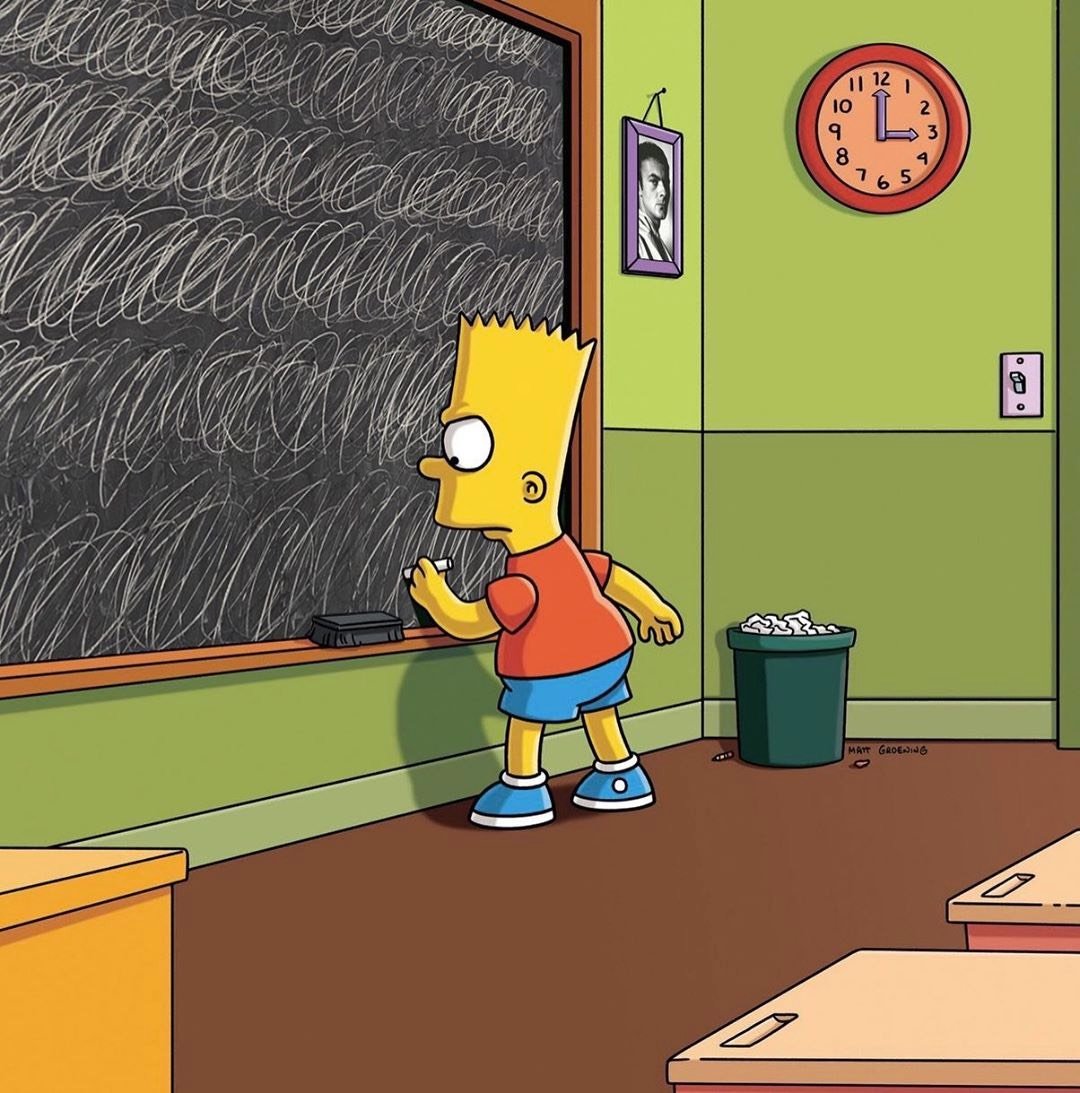
These mashups of fine art with The Simpsons are entertaining, but this one featuring Bart Simpson’s iconic blackboard subtly replaced by Cy Twombly’s 1968 chalkboard drawing Untitled (New York City) — perhaps the ultimate “my kid could have done that” piece of modern art — is a little bit of genius.
From Netflix, Challenger: The Final Flight is a four-part documentary series about the 1986 Challenger Space Shuttle disaster.
Incorporating never-before-seen interviews and rare archival material, this series offers an in-depth look at one of the most diverse crews NASA assembled, including high school teacher Christa McAuliffe, who was selected to be the first private citizen in space.
The series debuts on Netflix on Sept 16.
This is a teaser trailer for season four of The Crown that really lives up to its name. We know that Gillian Anderson is playing Margaret Thatcher (!!) and Princess Diana makes her first appearance in the series (played by newcomer Emma Corrin), but we don’t really get to see either of them clearly in the trailer. Which is frustrating but definitely gets me excited for its premiere on November 15th.

The English translation of Elena Ferrante’s latest novel, The Lying Life of Adults, is due out at the beginning of September and is available for preorder (Kindle). Here’s the synopsis:
Giovanna’s pretty face is changing, turning ugly, at least so her father thinks. Giovanna, he says, looks more like her Aunt Vittoria every day. But can it be true? Is she really changing? Is she turning into her Aunt Vittoria, a woman she hardly knows but whom her mother and father clearly despise? Surely there is a mirror somewhere in which she can see herself as she truly is.
Giovanna is searching for her reflection in two kindred cities that fear and detest one another: Naples of the heights, which assumes a mask of refinement, and Naples of the depths, a place of excess and vulgarity. She moves from one to the other in search of the truth, but neither city seems to offer answers or escape.
The Guardian and the Washington Post have reviews of the Italian version of the book. And Netflix has already announced that they’re producing a TV series based on the novel; here’s a short teaser:
The series is being made by the same folks responsible for HBO’s My Brilliant Friend series (based on Ferrante’s Neapolitan novels), which has been outstanding in its two seasons so far.
Filmmaker Errol Morris has uploaded the entire two-season run of his 2000-2001 TV series First Person to YouTube for free viewing: season 1 playlist, season 2 playlist. Each of the show’s 17 episodes is a one-on-one interview with someone who Morris finds fascinating, shot in the style that would find a wider audience and greater critical acclaim in The Fog of War two years later.
In the first season, Morris interviewed Temple Grandin about slaughterhouse design:
And Tony Mendez, former espionage expert for the CIA, whose work was the subject of the 2012 film Argo:
In season two, he profiled Josh Harris, one of the first internet celebrities:
Again, you can find every episode of First Person on YouTube: season 1, season 2.
Update: There’s an episode of First Person that has not been uploaded to YouTube: the one about Tanya Corrin (more on her here). That episode is also not listed on Morris’s site. I wonder what the story is here? (thx, @endquote)
Matthew Highton is recreating the opening credit sequences of TV shows using only stock video footage. Here’s the intro to Friends and (my favorite) the Duck Tales intro:
He’s also done Buffy the Vampire Slayer, Happy Days, The Young Ones, and the OC. Check out the entire playlist on YouTube or his thread on Twitter.
Fifty-one years ago today, on July 20, 1969, Neil Armstrong & Buzz Aldrin landed on the Moon and went for a little walk. For the 12th year in a row, you can watch the original CBS News coverage of Walter Cronkite reporting on the Moon landing and the first Moon walk on a small B&W television, synced to the present-day time. Just open this page in your browser today, July 20th, and the coverage will start playing at the proper time. Here’s the schedule (all times EDT):
4:10:30 pm: Moon landing broadcast starts
4:17:40 pm: Lunar module lands on the Moon
4:20:15 pm - 10:51:26 pm: Break in coverage
10:51:27 pm: Moon walk broadcast starts
10:56:15 pm: First step on Moon
11:51:30 pm: Nixon speaks to the Eagle crew
12:00:30 am: Broadcast end (on July 21)
Set an alarm on your phone or calendar!
This is one of my favorite things I’ve ever done online…here’s what I wrote when I launched the project in 2009:
If you’ve never seen this coverage, I urge you to watch at least the landing segment (~10 min.) and the first 10-20 minutes of the Moon walk. I hope that with the old time TV display and poor YouTube quality, you get a small sense of how someone 40 years ago might have experienced it. I’ve watched the whole thing a couple of times while putting this together and I’m struck by two things: 1) how it’s almost more amazing that hundreds of millions of people watched the first Moon walk *live* on TV than it is that they got to the Moon in the first place, and 2) that pretty much the sole purpose of the Apollo 11 Moon walk was to photograph it and broadcast it live back to Earth.
In 2018, I wrote about what to watch for during the landing sequence.
The radio voices you hear are mostly Mission Control in Houston (specifically Apollo astronaut Charlie Duke, who acted as the spacecraft communicator for this mission) and Buzz Aldrin, whose job during the landing was to keep an eye on the LM’s altitude and speed - you can hear him calling it out, “3 1/2 down, 220 feet, 13 forward.” Armstrong doesn’t say a whole lot…he’s busy flying and furiously searching for a suitable landing site. But it’s Armstrong that says after they land, “Houston, Tranquility Base here. The Eagle has landed.”. Note the change in call sign from “Eagle” to “Tranquility Base”. :)
For io9, Eleanor Tremeer digs into the complex and sexist legacy in Star Trek’s progressive universe. From Uhura on, Star Trek has always pushed the boundaries of how women were portrayed on TV, particularly in science fiction, but in some aspects, the shows have also been undeniably sexist.
With Yar gone, the women of The Next Generation fit more snugly into classic feminine molds, as Marina Sirtis reminisces. “They got it right, they cast a woman as the security chief. But Denise left, and the two remaining women were in caring professions. So it was ok to be on a spaceship as a woman, but you had to be a nurturer.” Speaking to io9, Gates McFadden (Crusher) is scathing about the few times the women would be thrown together, not to work together, but to gossip. “If the ladies did have a scene together we were dressed up in leotards talking about men. We weren’t sharing opinions on a medical issue!”
Over the ensuing years, Troi and Crusher would slowly get more screen time, as their characters became more nuanced, but they would rarely get the chance to break out of their nurturer molds. And with Crosby gone, security chief wasn’t the only position that needed filling. “I was never supposed to be the chick on the show, the va-va-voom. That was supposed to be Denise,” Sirtis told us. For as progressive as Star Trek tried to be with its women, every show has something in common: There has to be a hot chick.
To understand why this was the case, you have to look behind the scenes and at who was making the casting and plotting decisions.
If the entertainment industry is dominated by men now, this was even more the case decades ago. Star Trek has had a few female writers and producers over the years-DC Fontana wrote for The Original Series, The Next Generation, and Deep Space Nine; Jeri Taylor got her start producing The Next Generation before co-creating Voyager, to name just two immensely influential staffers. But, as Sirtis points out, Star Trek was a franchise created by men: “Even though we were writing a show about the 24th century, apart from Jeri Taylor and Melinda Snodgrass [another writer], the writers and producers were all men. Twentieth-century men. So it’s not gonna be that far-reaching.”
We could argue, of course, that Star Trek was a product of its era, but the actors were aware, at the time, that the show could be better. This aggravated Gates McFadden, as early as season one of The Next Generation, as she revealed to io9. “I wondered, did the women exist for the men to react to? Even Wesley just reacted to his mother, not seeking out her counsel-for counsel he sought out the men on the ship.” Coming from academia, McFadden was used to a collaborative creative environment, but she didn’t encounter that behind the scenes of The Next Generation. “Jonathan Frakes could bound into the producer’s office and put his feet up, but I couldn’t. That wasn’t acceptable.”
I’m rewatching The Next Generation right now and have been paying a lot of attention to how the women on the show (both the recurring cast and various single-episode characters) are portrayed. There’s definitely improvement after the first season or two, but there’s just so much on the show that’s off and obviously written primarily by and for men.
Anyway, if you’re a Star Trek fan at all, you should read Tremeer’s whole piece.
Season four of The Handmaid’s Tale is coming to Hulu in 2021. I found season 3 to be increasingly outlandish — not in terms of the depicted fascist policies and behaviors of Gilead (Atwood has stated that in her books & the TV series, all events have a precedent) but just in terms of “How the hell is June still alive and working in Gilead?!” Also, the use of closeups of Elisabeth Moss’s facial expressions to convey emotion was overused to the point of cliche. But I will definitely give season four a shot, especially now that we know where the series is ultimately headed.
Netflix has put When They See Us, Ava DuVernay’s 4-episode mini-series about the Central Park Five, in front of their paywall for free viewing. Here’s the trailer:
The 2013 Ken Burns documentary The Central Park Five is available to watch on the PBS site and also on Amazon.
As previously noted, DuVernay’s 13th and Selma are also both available to watch online for free.
For 35 years, activist and archivist Marion Stokes recorded television news coverage on VHS tapes, amassing a collection of hundreds of thousands of hours of footage. Matt Wolf has produced a documentary about Stokes called Recorder: The Marian Stokes Project.
For over 30 years, Marion Stokes obsessively and privately recorded American television news twenty-four hours a day. A civil rights-era radical who became fabulously wealthy and reclusive later in life, her obsession started with the Iranian Hostage Crisis in 1979 — at the dawn of the twenty-four hour news cycle. It ended on December 14, 2012 as the Sandy Hook massacre played on television while Marion passed away. In between, Marion filled 70,000 VHS tapes, capturing revolutions, wars, triumphs, catastrophes, bloopers, talk shows and commercials that show us how television shaped the world of today and in the process tell us who we were.
A mystery in the form of a time capsule, Recorder delves into the strange life of a woman for whom home taping was a form of activism to protect the truth (the public didn’t know it, but the networks had been disposing their archives for decades into the trashcan of history) and though her visionary and maddening project nearly tore her family apart, her extraordinary legacy is as priceless as her story is remarkable.
The trailer is above and you can watch the whole thing for free on PBS for a limited time.
Stay Connected